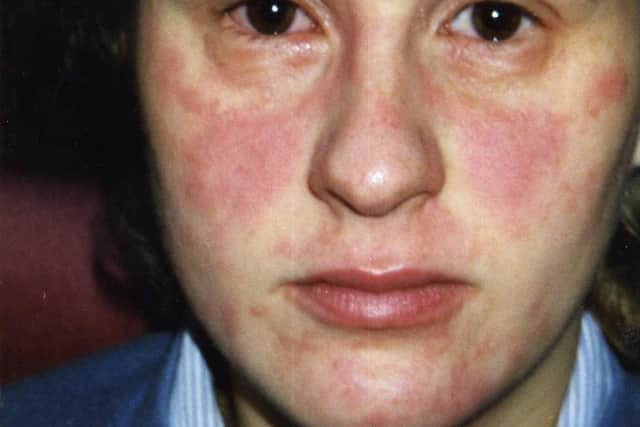‘Why eczema made me not want to bring children into the world,’ says top Yorkshire businesswoman


Suzanne Watson developed severe eczema in her early teens. With skin at times so raw it looked burned and treatment regimes including tar baths, bandaging, layers upon layers of creams, baths with her hands held to prevent scratching and a compulsion to hide away rather than step outside… she never could have imagined her life today.
At 49, Suzanne is President of the Bradford Chamber of Commerce – only the second female president in its 169 year history – a Governor at Bradford Grammar School and a trustee of the National Eczema Society. As MD of award-winning, Ilkley-based PR consultancy Approach, which she launched almost 20 years ago, today Suzanne is no stranger to fronting media campaigns, being photographed, speaking to the press, chairing meetings and presenting at events.
Advertisement
Hide AdAdvertisement
Hide AdLast year, she hosted her first Annual Chamber Dinner, speaking in front of more than 200 business leaders, local government representatives and celebrities.


But the journey hasn’t been easy.
“After battling with the horrific disfigurement, pain and shame that eczema caused through my teens and early 20s I truly never thought I’d be eczema free. As a young journalist and PR consultant I found it difficult to look people in the eye during interviews and meetings because I was brutally aware of how “different” I looked and I used to gaze longingly at anyone with “normal” skin.
“I’d get scared during eczema flare-ups because I ‘d realise I was losing control. I couldn’t stop myself from scratching and all of a sudden I’d realise that with my own bare hands, I was actually mutilating myself. And if it wasn’t with my hands, I’d use scissors, pen lids, rulers, combs – anything to relieve the torment of the itch.
“I truly didn’t want to bring children into the world who might suffer as I suffered,” Suzanne explains. “And I certainly didn’t want to continue working in a world where I felt judged and exposed.”


Advertisement
Hide AdAdvertisement
Hide AdSuzanne’s eczema improved when she became pregnant with her daughter Melissa in 1999. Three years later she had a son, Ben, who has gone on to develop severe eczema, while Melissa suffers mildly with patches on her scalp and hands.
“Ben’s face and the creases of his elbows and knees were the most badly affected and as a baby, I would absolutely slather him in thick, greasy emollient and put special body bandages on him to help protect him from scratching – which is uncontrollable whether you’re a baby, a child or an adult – and help the creams to work better.
“Because we both suffer with eczema, when Ben was younger we considered ourselves quite exclusive. He would tell me to stop scratching and I’d encourage him to rub rather than scratch. He’s now 17 so entirely self manages his skin. It isn’t easy and his flare ups – like mine – can be caused by stress or allergens. But with my experience and his resilience, it doesn’t often get us down.
“The good thing is, I understand just how he feels and I think that’s hugely important. Feeling isolated and like nobody can possibly understand is one of the most distressing and common elements of living with the condition.
Advertisement
Hide AdAdvertisement
Hide Ad“The key is understanding the signs and recognising that when your skin fails you, it can impact on your emotional wellbeing as well as your physical wellbeing. In my teens when my eczema took hold, the way I looked and the pain of my skin was all consuming making the condition even worse to cope with.
“Eczema does rear its head today but I’m old enough and wise enough to take it more in my stride. The itch remains the worst thing to cope with. The red and angry appearance of a flare up and the legacy of having “older-looking”, dry skin is something I’ve learned to live with.
“I certainly didn’t think my eczema would ever be anything other than a negative in my life. But because of it, I’ve become stronger, unexpectedly empowered and absolutely more determined than ever to be a voice which offers support, comfort and strength to others going through their own, very personal, eczema journey.”
A new report out to mark National Eczema Week (12-19 September) reveals that people living with eczema pay a heavy price in lost opportunities throughout their lives,It found that 89 per cent of adults confirmed that having eczema has significantly reduced their quality of life, with nearly half of those surveyed saying it had affected their education, 28 per cent stating it had had a negative impact on their career – rising to 48 per cent amongst those with severe eczema – and one in 10 having had a romantic relationship end due to their condition.
Advertisement
Hide AdAdvertisement
Hide AdThe new survey also reveals how eczema’s impact on every aspect of life takes a substantial psychological toll on sufferers, with 74 per cent of adults saying it had negatively impacted their mental health, leaving them feeling depressed, anxious, helpless and socially isolated. Despite this, less than half had been offered access to emotional or psychological support to help them to manage this.
“As well as the physical symptoms of itchy, sore, cracked, bleeding skin, eczema drives so many decisions a patient makes,” explains National Eczema Society Chief Executive, Andrew Proctor. “From what you wear, to the activities you can and can’t take part in, to where you go on holiday. If you live with eczema you have to constantly plan and prepare. Set against the backdrop of a time-intensive and messy skincare regime, and regularly disturbed sleep, life with eczema can be all-consuming, for children and their parents, and for adults who have eczema.”
Comment Guidelines
National World encourages reader discussion on our stories. User feedback, insights and back-and-forth exchanges add a rich layer of context to reporting. Please review our Community Guidelines before commenting.